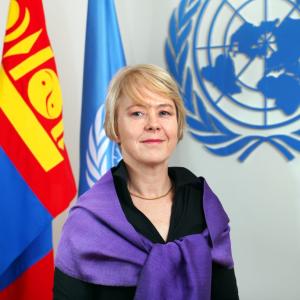Esteemed Mr. Sundui Batbold, Mayor of Ulaanbaatar City and Governor of UB City Municipality,
City representatives from Cilacap Regency, Dhaka, Honiara, Kathmandu & Mawlamyine
Mr. Sanjava Bhatia, Director of NorthEastAsia Global Education & Training Institute of UNISDR
Thank you for inviting me to speak at this workshop.
All around the world, cities are fast becoming the frontline of development.
In 2008, for the first time in human history, the world population living in cities exceeded that of people living in the country side. The Asia Pacific region is home to half the world’s urban population. Eleven of the largest 20 cities in the world are located in Asia.
Cities are centres for ideas, education, political power, technology, social services, culture, finance and jobs. They play a critical role in human development. Indeed, very few countries have reached high levels of human development without high levels of urbanization.
But, cities can also hold us back. Problems of urban poverty and inequality are starkly illustrated by urban slums, where residents face risks of eviction; hazards of floods, urban squalor and criminality. Given the lack of access to standard public service systems, slum dwellers are often faced with disproportionally high cost for water, energy and transportation and subjected to poor sanitation creating inequities between urban populations. Today 520 million people live in urban slums in Asia, of which 190 million are in East Asia.
Cities are both the source and victims of environmental problems. Air pollution is the number 1 enemy of many Asian cities including in Ulaanbaatar. It is estimated that every year, air pollution in Asia causes over 500 thousand premature deaths. The impact of cities on air pollution is not only local, but global – cities are major producers of greenhouse gas emissions, producing 60-80 percent of carbon emissions. Urban buildings, transportation, and the reduction of green spaces as carbon sinks to make way for urban developments - all contribute to making cities major emitters.
We need to plan for cities that are liveable, safe, healthy, sustainable, and promote human development for all who live in them.
We need more affordable housing, so the poorest families have options outside informal settlements. We need to reduce air pollution by improving energy efficiency, finding alternative renewable sources of energy generation and by reducing emission from vehicles and public transport. And we must invest in disaster preparedness and risk reduction.
Development cannot be sustainable if it is not risk informed. Every disaster reverses development gains and absorbs resources that could have otherwise gone into reducing poverty. Every dollar spent on reducing people's vulnerability to disasters saves around four dollars in post-disaster recovery. Investing in prevention boosts the resilience of countries and cities to future disasters. It also protects economic growth and other achievements from being lost.
That is why, in the case of Mongolia, I was happy to see the country’s three biggest cities joining UNISDR’s campaign on “Making Cities Resilient” in October 2016.
At the UN, we support Mongolia in strengthening emergency preparedness and response capacities at national and local levels in line with the Sendai Framework for Action. Mainstreaming disaster risk reduction and promoting sustainable environmental management, to reduce the threat and costs of future disasters are key elements of our efforts.
Without cities addressing the development challenges they face today, achieving the SDGs – the global agenda to end poverty, reduce inequality and protect our planet – will not be possible. It is for that reason that the SDGs include a specific goal on cities – Goal number 11 – to make cities more inclusive, safe and resilient.
Supporting the achievement of the SDGs and Mongolia’s own Sustainable Development Vision 2030 is at the very heart of the UN’s work here. In the urban context, an important step has been made with UB City partnering with UNDP to align the city’s development plan with the SDGs and the SDV 2030.
We stand ready to work with UB city and other municipal partners in Mongolia to design concrete solutions for people-centered, environmentally friendly, urban development to enable a fair and sustainable future for all.
I wish you a successful meeting and pleasant stay in Ulaanbaatar!
Thank you.















